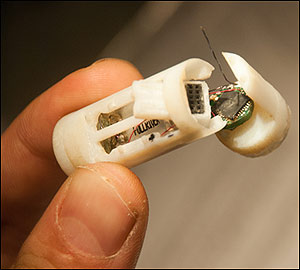Four Vanderbilt School of Engineering faculty members have been awarded a $1 million grant from the National Science Foundation to create new tools, including a web-based modeling and simulation infrastructure, intended to help speed up the development of miniature medical capsule robots.
The four-year project – Cyber-Physical Systems: Integrated Modeling, Analysis and Synthesis of Miniature Medical Devices – involves creating cyber-physical design and simulation platforms to capture the computational and physical components of tiny devices designed to work inside the human body. By eliminating large incisions in favor of natural orifices or small ports, these medical devices can increase diagnostic screening effectiveness and reduce pain and recovery time.
Cyber-physical systems (CPS) are engineered systems that are built from and depend upon the synergy of computational and physical components. Examples of the many CPS applications include the smart electric grid, smart buildings, smart medical technologies, next-generation air traffic management and advanced manufacturing.

The team is led by Pietro Valdastri, the principal investigator and assistant professor of mechanical engineering, and includes Akos Ledeczi, associate professor of electrical engineering and senior research scientist; Peter Volgyesi, research scientist, electrical engineering; and Robert Webster, assistant professor of mechanical engineering.
“Our work is intended to enable wider design exploration and, ultimately, to lower the barriers that have thus far impeded system engineering of miniature medical devices in general, and swallowable capsule robots in particular,” Valdastri said.
“Currently only a few individuals with deep domain expertise create these systems. The goal is to open this field to a wider community and, at the same time, create better designs of miniature medical devices through advanced tool support,” he said.

“Our focus will be on capsule robots to diagnose, prevent and cure colorectal cancer working in collaboration with Keith Obstein, assistant professor of gastroenterology at the Vanderbilt University Medical Center. Transformational societal public health benefits are possible through less invasive and more accurate diagnostic and interventional devices. These have the concrete potential to facilitate and foster screening programs,” Valdastri added.
The project defines a component model and corresponding domain-specific modeling language to provide a common framework for design capture, design space exploration, analysis and automated synthesis of all hardware and software sub-components of a capsule robot.
The team also will develop an extensive component and design template library for designers. The online design environment will provide early feedback and the researchers believe it will lower the cost of experimentation. “The potential benefit is not just incremental – in time and cost – but can lead to novel ideas by mitigating the risk of trying unconventional solutions,” Valdastri said.
Valdastri said the web-based design environment will contain an interface for high school students to experiment with building virtual miniature devices from a set of predefined building blocks and operating them in various simulated environments. The team plans to organize a free summer camp for local high school students to build and program real devices the engineers create throughout the four-year project.
This research is supported by a National Science Foundation grant (1239355).